WORDPRESS
Best Plugins for WordPress Designers, Developers & Newbies

Are you looking for this year’s best plugins for WordPress, but not sure where to look? Stay tuned into this featured post, because we will cover the best plugins for all WP web designers, developers, and beginners.
If you use the WordPress.org platform for your website-building projects, you already know you’re on the right track. Nevertheless, incorporating certain features or functionality you would like to have in a website is often easier said than done. As to do so may require design or coding skills you simply don’t possess.
Sponsored Message
Fortunately, there are software add-ons. More commonly known as plugins. They are exactly what you need to add those custom features or functionalities without programming knowledge. In addition, WordPress plugins can be used to optimize website SEO, boost speed, and performance, and more.
Check out these 9 best WordPress plugins for your website projects in 2023. One or more of them might not only have what you need but could far exceed your expectations.
9 Best Plugins for WordPress Designers, Developers & Beginners
1. Brizy – Best Website Builder Plugin for Non-techies
Here we have Brizy, a cloud-based website builder that can be used to customize a website or to build your own from scratch. Brizy is free to download (a Pro version is available) and you don’t have to be a techie or proficient at programming to use it.
- Brizy theme builder makes it as easy as it gets to improve any page or section of an existing website.
- With the help of the builder’s dynamic elements (shortcodes, sidebar, breadcrumbs, post info, etc.) you can create dynamic templates for special pages, headers, and footers, and even repeating header and footer blocks.
- 150+ high-converting pre-made templates are ready to put to use together with a selection of dynamic elements (posts elements, breadcrumbs, shortcodes, sidebar, etc.).
- If you select the 100% White Label option, you can brand the builder as your own.
- WooCommerce integration is included for building or customizing an online store.
Click on the banner to learn more about this cloud-based WordPress theme builder.
2. WpDataTables – WordPress Tables Plugin
Although you may be quite capable of creating an attractive and informative table or chart that viewers will appreciate, creating one that is interactive, responsive, and user-editable could involve more than you may want to take on.
wpDataTables is a premium WordPress table plugin that can make such a task relatively quick and easy. Over 66,000 companies and individuals working with huge amounts and various types of complex data have enjoyed great success using wpDataTables with its –
- Google Charts, Highcharts, Chart.js, and Apex Charts chart-building engines
- ability to process huge amounts of complex data from multiple sources and in various formats
- ability to create responsive, informative, and editable tables
- ability to highlight key information.
Click on the banner to learn more about how this WordPress plugin can make those scary-looking tasks fun and easy to complete.
3. Amelia – WordPress Booking Plugin
Amelia is a WordPress booking plugin designed to streamline manual or semi-automated appointment booking operations. As such, it is an ideal choice for client-beauty salons, spas, health and fitness centers, consulting operations, and other heavily client-driven businesses.
Amelia –
- enables clients to book appointments online 24/7
- manages group and package bookings, ticket sales, and events bookings
- easily manages unlimited appointments at multiple locations, and does so from a single platform and dashboard
- sends notifications and reminders to clients via SMS, Email, or WhatsApp
- brand matches booking forms and fields
- supports WooCommerce and accepts bookings payments via PayPal, Stripe, Mollie, and Razor.
Click on the banner to find out more about how Amelia could help to save your business time and money and keep your clients satisfied.
4. TheDock – Ship Solid Websites
TheDock is a team-oriented WordPress theme builder/visual editor that encourages the collaboration that is often needed to create websites faster and more efficiently. Theme editing happens in the cloud enabling easy communication among designers and developers.
- TheDock’s templating system gives designers complete control over their themes’ designs.
- Global UI style and Global Modules enable rapid assignment to any post in WordPress.
- The Layout Editor allows visual editing of templates while TheDock writes the code.
5. Slider Revolution (more than a WordPress slider plugin)
More than just a slider plugin, Slider Revolution’s role in your design toolkit has expanded to assist you in adding healthy doses of spice and flair to your website that will impress your visitors or customers.
It does so with:
- innovative website animation effects.
- A selection of 250+ carefully crafted website and slider templates designed to engage and impress.
Slider Revolution is trusted by over 9 million users around the world.
6. LayerSlider – Best WordPress Slider Builder Plugin
Take the best WordPress Slider plugin on the market, and give new or existing websites a modern look and feel that will impress your clients and visitors alike.
- LayerSlider has all the tools to help you spice up and add a touch of pizzazz to an otherwise run-of-the-mill website.
- LayerSlider will support any WordPress theme and page builder
- LayerSlider’s 210+ customizable website, slider, and popup templates are excellent starting points for new projects.
7. Download Monitor – Best WordPress Download Manager
With the “Download Monitor” WordPress plugin, you can streamline and safeguard your business operations by enabling your staff to better track and protect their file downloads. Over 100,000 people currently use Download Monitor.
This WordPress downloads manager can:
- track all standard types of file downloads (ZIP, PPT, XSLX, PDF, etc.).
- give staff members access to file download statistics.
- Set advanced access rules based on user roles, download quota, and integrations with other plugins.
8. Essential Grid – Best WordPress Grid Plugin
You want your gallery to be the focal point of your website, but if you don’t go about it correctly it could end up as just another page.
Essential Grid is the best WordPress grid plugin you could choose to avoid that situation due to its –
- 50+ professionally crafted and customizable grid templates.
- eye-catching layout options that include boxed, full-width, and full-screen layouts combined with even, masonry, and cobble grid items.
- responsive designs that enable you to control grid appearances on different devices.
9. Ads Pro – WordPress Ad Manager Plugin
The Ads Pro WordPress advertising plugin is easy to install and use, providing an exceptional capacity of promotional, advertising, display, sales, and management possibilities to work with including:
- user panels for admin and frontend along with front-end order form, all designed to assist you in managing and selling ads effectively and efficiently.
- 20+ ad display choices such as display options for Facebook
- 25+ customizable ad templates, 4 payment, and 3 billing functions.
Best Plugins for WordPress Designers, Developers & Newbies in 2023 Summary
One or more of the 9 best WordPress plugins for 2023 featured in this article could give your websites extra needed functionality. Or maybe extra flair and spice would make them more engaging. The right WordPress plugin could even take your business to the next level in a given situation.
Check out these 9 awesome WordPress plugins for your website projects in 2023. One or more of them might not only have what you need, but as I already mentioned, it could far exceed your expectations!
WORDPRESS
Our CloudFest Hackathon Report – WordPress.com News

With WordPress today you need to use custom code or a plugin to create a custom post type like “Book” or “Member.” This is a popular need, and there are a variety of approaches; however, one challenge is that the end-user experience can be confusing and non-standardized.
A few weeks ago, some Automatticians and I went to the 7th CloudFest Hackathon in Rust, Germany to explore a solution for this. We started hacking on a deeply nerdy project, JSON Schema forms and fields, and ended up with a fascinating approach to an age-old question: What if you could register custom post types and custom fields directly in the WordPress admin?
Forty-eight hours turns an idea into reality
The CloudFest Hackathon is an event that allows developers from around the globe to take ideas and turn them into realities.
During the Hackathon, teams of developers from various content management systems and hosting companies come together to contribute to projects that align with the core principles of the event: the projects must be not-for-profit, interoperable, and open source.
Last year, we worked on a project that allowed us to embed WordPress directly in VS Code. We built the WordPress Playground VS Code extension on top of WordPress Playground. It uses WebAssembly to run WordPress entirely within the browser, and it turned out pretty darn slick.
This year, we focused on a JSON Schema Field/Form Renderer. While most of us explored using JSON Schema to dynamically register admin forms and fields, Dennis Snell and Adam Zieliński decided to take the project one step further! They hacked together a plugin that introduced the ability to register custom post types and custom fields directly from the WordPress admin. More notably, everything happens within the block editor—you have to see it to believe it:
This work poses some interesting possibilities for custom post type and custom field implementation because it could fundamentally change the way low- to no-code WordPress users modify their sites.
Naturally, I took the idea to Twitter/X:
I got quite a range of responses, ranging from “Heck Yes! It should have already been a core feature now. Such an integral part of every other site” to “Admin should only be for content and user management. Everything else should be configured in code and version controllable.”
So why the range in responses? Let’s discuss.
It turned out to be pretty simple
Dennis and Adam built our prototype using the following conventions:
- A custom post type
wp_data_typeholds templates for user-defined data types. - The title of a post in the
wp_data_typedefines the name of the new data type. The post itself is the rendering template and comprises any set of normal blocks. Names are given to select block attributes within the post, and these names are mapped into the data type. - When creating new posts for the given data type, the locked template is copied from the
wp_data_typetemplate, and the block attribute annotations are preserved. - Finally, when rendering the
wp_data_typetemplate, the attributes are pulled from the individual post of the given data type and spliced into the template.
The fascinating idea is that we don’t have to think about form fields; blocks already provide a rendering view and a modal editing experience. We can rely on the fundamental way blocks work and use the very same user experience to create custom data types in a way that users are already familiar with when editing a post or a site.
Custom post types define custom data types, so we use a template to not only define the data type, but also to provide a default rendering template. Each data attribute within a post type has a field where it’s possible to define that field with its JSON-LD property.
For example, say you had a “Book” custom post type. A few JSON-LD properties you could define using custom fields are:
descriptioncopyrightYearauthorbookEditionbookFormatisbnnumberOfPages
We also chose to store a copy of each block attribute in the JSON attributes for that block. Since WordPress can now provide a post-to-JSON function, which merges the extracted attributes with the names assigned in the custom post type template, that template may have changed since the custom post was created. This means that no database migrations are necessary to render an updated version of a post.
The best part? The WordPress infrastructure that already exists (aka Gutenberg!) defines the data type. Because these custom posts are normal posts, and because they adopt the locked template for the data type definition, they are, in fact, renderable on their own! Even if the template has been updated and only the post itself is rendered, it will still display a meaningful representation of the data type as it was when it was created.
While our original Hackathon project was tailored towards developers and UX designers who would love to see a forms and fields API in WordPress, this prototype puts more power in the hands of low- to no-code WordPress users.
It also opens up a world of possibilities for providing a rendering view for any structured data. Imagine uploading a CSV and mapping the column names to block attributes, or connecting to a database or JSON API to map the records in the same way.
For example, if you had a CSV with business names, addresses, a rating, and a description, we could take that template post and insert a map block, a heading block, a star rating block, and a paragraph block and set the attributes to map to the CSV columns. It’s essentially an instant structured data renderer!
But even if we can define custom post types and fields in the editor, should we, as a WordPress community, consider adding it to core?
The existential question: Should it exist?
Adding this kind of functionality into WordPress core could open up a ton of opportunities for the average WordPress user. Instead of needing to get a developer involved to add a custom post type to their site, a user could simply do it themselves and define the necessary fields and structured data attributes.
On the other hand, allowing everyday users, who may not have a full grasp of how custom post types and structured data should work, free reign to create these data types themselves could have detrimental effects on the user experience of their websites. Clunky or incorrect implementation of structured data markup could also cause issues with how search engines crawl these sites, causing unintended negative impacts to search traffic.
Not only that, but as of right now, if a custom post type is accidentally deleted, all of the content posted to that custom post type will no longer be accessible through the admin (even though it will still be stored in the database). The user could think they “lost” their data.
Let’s talk about it
What do you think? Are you in favor of giving website owners the ability to change and customize their custom post types and attributes? Or are there some website features that should always require a more technical hand and implementer?
We’d love to chat with you about your thoughts in the comments below.
For another interesting exploration on a related idea, check out this discussion on GitHub with the core team.
Thanks to Lars Gersmann for leading the JSON Schema project with me and to everyone on the Syntax Errors team: Adam Zieliński, Dennis Snell, Julian Haupt, Michael Schmitz, Anja Lang, Thomas Rose, Marko Feldmann, Fabian Genes, Michael Schmitz, Jan Vogt, Lucisu, Maximilian Andre, Marcel Schmitz, and Milana Cap.
Join 110M other subscribers
WORDPRESS
Turkish startup ikas attracts $20M for its e-commerce platform designed for small businesses

It’s easy to assume the e-commerce ship has sailed when you consider we have giant outfits like Shopify, WooCommerce and Wix dominating the sector. But the opportunity for e-commerce platforms that cater to brands remain vast and fertile, since so many smaller businesses continue foraying into the internet in the wake of the pandemic.
Further evidence of this has surfaced in the form of one of the largest fundraises by a startup in Turkey, given that the average Series A usually comes in at below $15 million. E-commerce platform ikas has raised $20 million in a Series A funding round as it seeks to expand its operations into new markets in Europe. The company currently operates in Turkey and Germany, and says its platform simplifies store management for companies that want to have a digital presence.
The investment was led by the International Finance Corporation (IFC) fund, a venture arm of the World Bank Group.
ikas’ co-founder and CEO Mustafa Namoğlu told TechCrunch that the company would be using the new funding for international expansion in Eastern Europe and the DaCH region.
“Most of Europe is predominantly neglected or underserved by those U.S.-based giants,” he said. “The global platforms lack customer service in local languages. It looks easy to start with, for example, a Shopify. But once you start, you need to add other plugins, and you may even need an agency to run it.”
Namoğlu said ikas can win customers against other platforms because it’s more of a “fire and forget” platform. “The first reason our merchants pick us over others is storefront speed, which gives them higher conversion rates. You get this out of the box, even if you pay us €30 per month. The second reason is customer service. Thirdly, we bundle the payments and the shipping labels into our core product, which means you don’t need to go and negotiate with payment providers or shipping labels. You’re immediately ready to go,” he said.
Namoğlu previously founded MUGO, a fashion distribution and retail company, and launched ikas in 2017 with co-founders Tugay Karaçay, Ömercan Çelikler and Umut Ozan Yildirim.
The IFC invests directly in companies as well as through PE and VC funds.
Also investing in ikas is Re-Pie Asset Management, which has grocery delivery startup Getir in its portfolio. The round saw participation from ikas’ existing investor Revo Capital, best known as the first institutional investor in Getir, Param, Midas and Roamless.
WORDPRESS
Introducing the Public Pattern Library – WordPress.com News

When it comes to website-building, WordPress themes set your site up for success by providing stylish, preselected options for fonts, colors, and layouts. Even though themes provide the overall aesthetic, you still need to build out the posts, pages, and templates on your site. That’s where block patterns come in!
The WordPress.com Pattern Library is your new go-to resource for finding any kind of pattern for your beautiful WordPress website. With hundreds of pre-built patterns to choose from across over a dozen categories, you’ll be covered no matter your website’s specific needs.
What are patterns?
Block patterns are collections of blocks made to work seamlessly with our modern themes. Need an “About” page? Check. A gallery? Check. A testimonial? Check. How about a newsletter? Check. We have just about anything you’ll need.
Best of all: for each pattern, the fonts, colors, and spacing will adapt to your theme’s settings, making for a cohesive look. Still, patterns aren’t locked or static either—after you’ve added the pattern to your post, page, or template, you can tweak it however you like.
A tour of the Pattern Library
This new public Pattern Library allows you to browse, preview, and easily share or implement whichever design speaks your tastes. Let’s take a look around.
Browse all categories
If you want to explore the Pattern Library and don’t have anything in particular that you’re looking for, click through each category to spark some ideas.
Search for what you need
At the top, you’ll find a fast and easy-to-use search box, allowing you to find exactly what you need. This is a great option if you don’t feel like browsing and want to jump right into a solution for your specific needs.
Explore page layouts
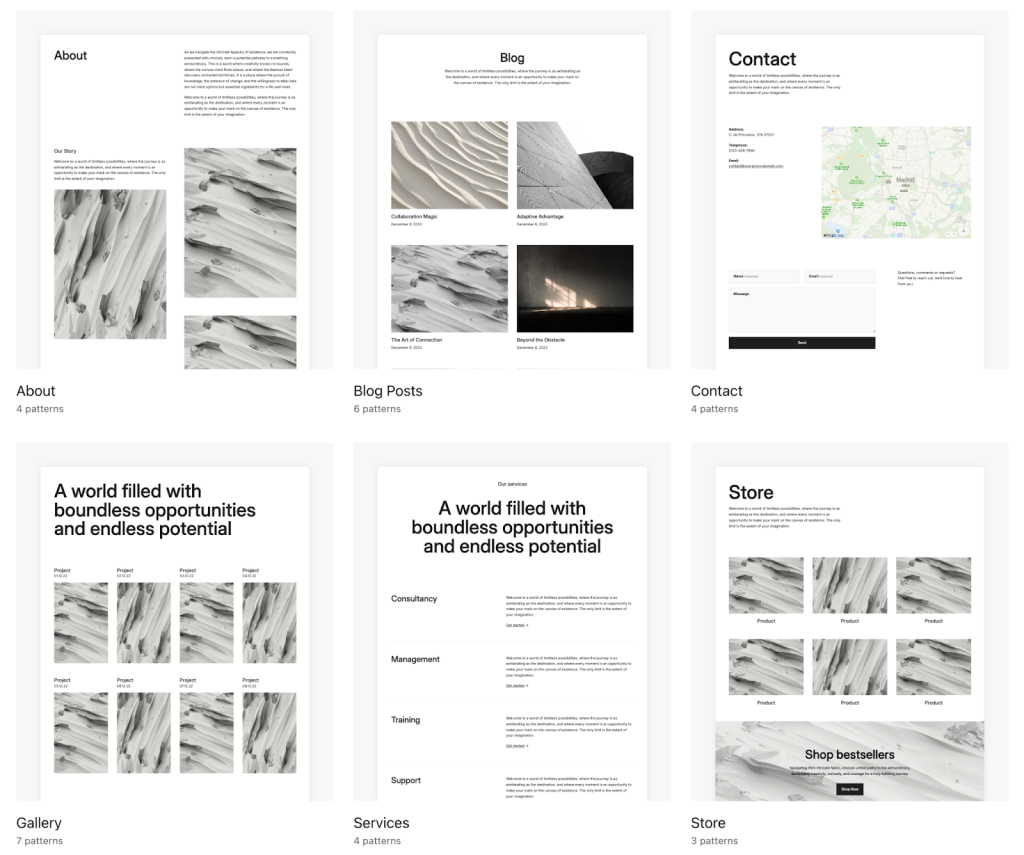
Sometimes you just need the components of a post, page, or template: a header, a “Subscribe” box, a store module, etc. Other times, you want to be able to copy and paste an entire page into existence. Scroll down past the categories and you’ll find our full-page patterns for whole pages: About, Blog, Contact, Store, and more.
Test the mobile responsiveness for each pattern
When looking through the library on a desktop or laptop device, you’ll see a gray vertical bar next to each pattern. That’s a nifty little slider that we’ve built into the library which allows you to see how each pattern responds to different screen sizes. Using your cursor to move the bar to the left, you’ll see what that design looks like on a mobile device; in the middle is where most tablets fall; and scroll back all the way to the right for the desktop/laptop version.
Copy and paste to your website
Like what you see? Simply click the blue “Copy pattern” button, open the WordPress.com editor to the post, page, or template you’re working on, and paste the design. It’s that easy. Once inserted, you can customize each block as needed using the right sidebar.
Your new favorite page-building tool
The Pattern Library is especially useful if you build websites for clients. Each pattern is built to work with any theme that follows our technical standards, speeding up page-building not just for you but also for your clients—all while maintaining the overall style of your theme.
In concrete terms, this means that our patterns take font, color, and spacing settings from the theme itself rather than using standard presets. This makes it far less likely for a site to break (or just look off) when you—or a client—experiment and make updates.
Our goal is always to make your life both easier and more beautiful. This new resource does just that. Check out the WordPress.com Pattern Library today to enhance your website-building experience!
Join 109.9M other subscribers
-

 WORDPRESS6 days ago
WORDPRESS6 days ago10 WordPress Influencers to Follow in 2024 – WordPress.com News
-
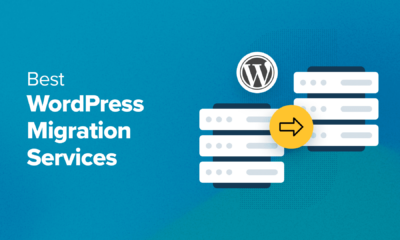
 WORDPRESS7 days ago
WORDPRESS7 days ago8 Best WordPress Migration Services (Compared)
-

 MARKETING6 days ago
MARKETING6 days agoFeeling Stuck: What to Do When You Don’t Know What to Do
-

 SEARCHENGINES6 days ago
SEARCHENGINES6 days agoGoogle Image Search Adds Pixel Level Object Segmentation Animation
-

 PPC5 days ago
PPC5 days agoA History of Google AdWords and Google Ads: Revolutionizing Digital Advertising & Marketing Since 2000
-

 SEARCHENGINES5 days ago
SEARCHENGINES5 days agoMore Google March 2024 Core Update Ranking Volatility
-

 PPC5 days ago
PPC5 days agoCompetitor Monitoring: 7 ways to keep watch on the competition
-

 PPC5 days ago
PPC5 days ago31 Ready-to-Go Mother’s Day Messages for Social Media, Email, & More

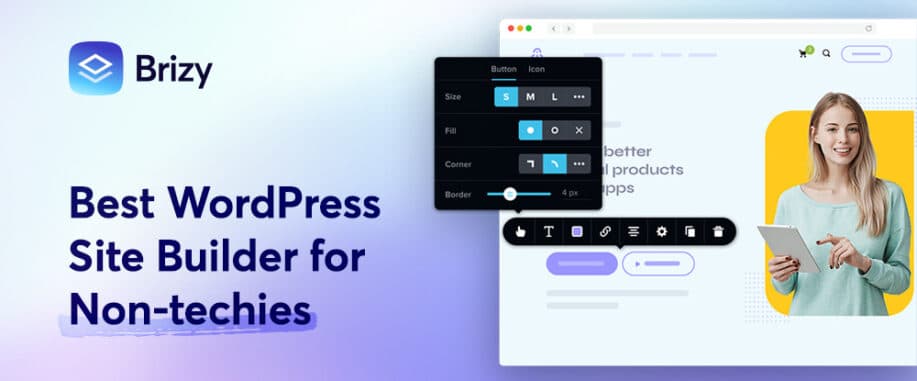
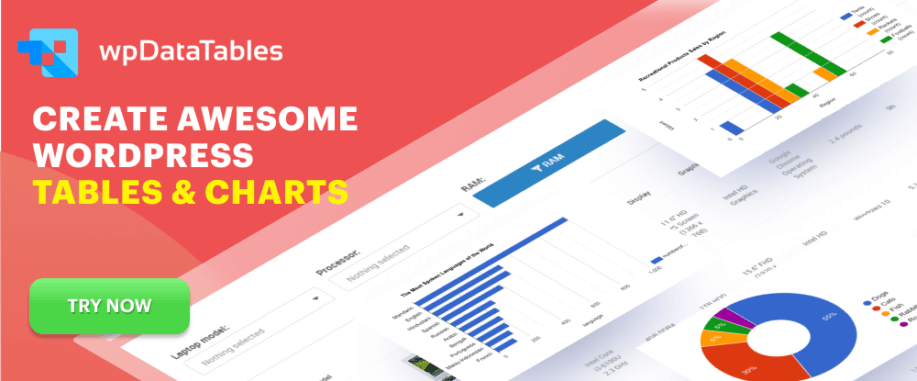
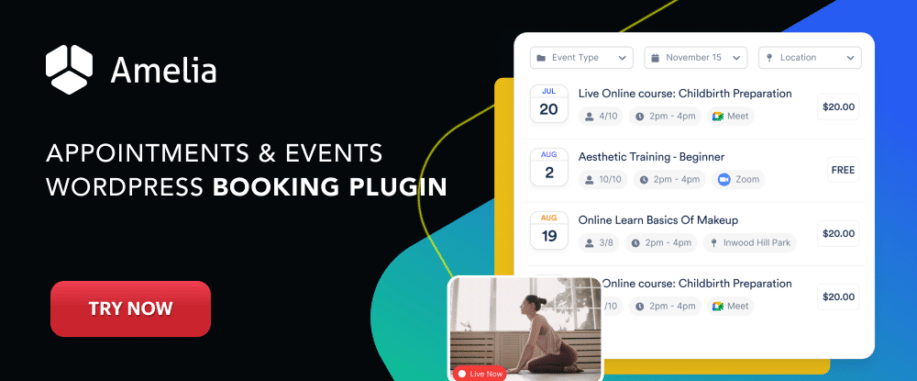



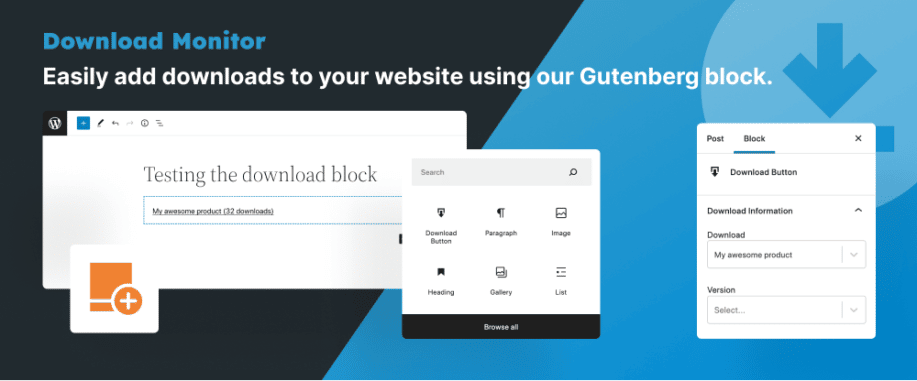













You must be logged in to post a comment Login